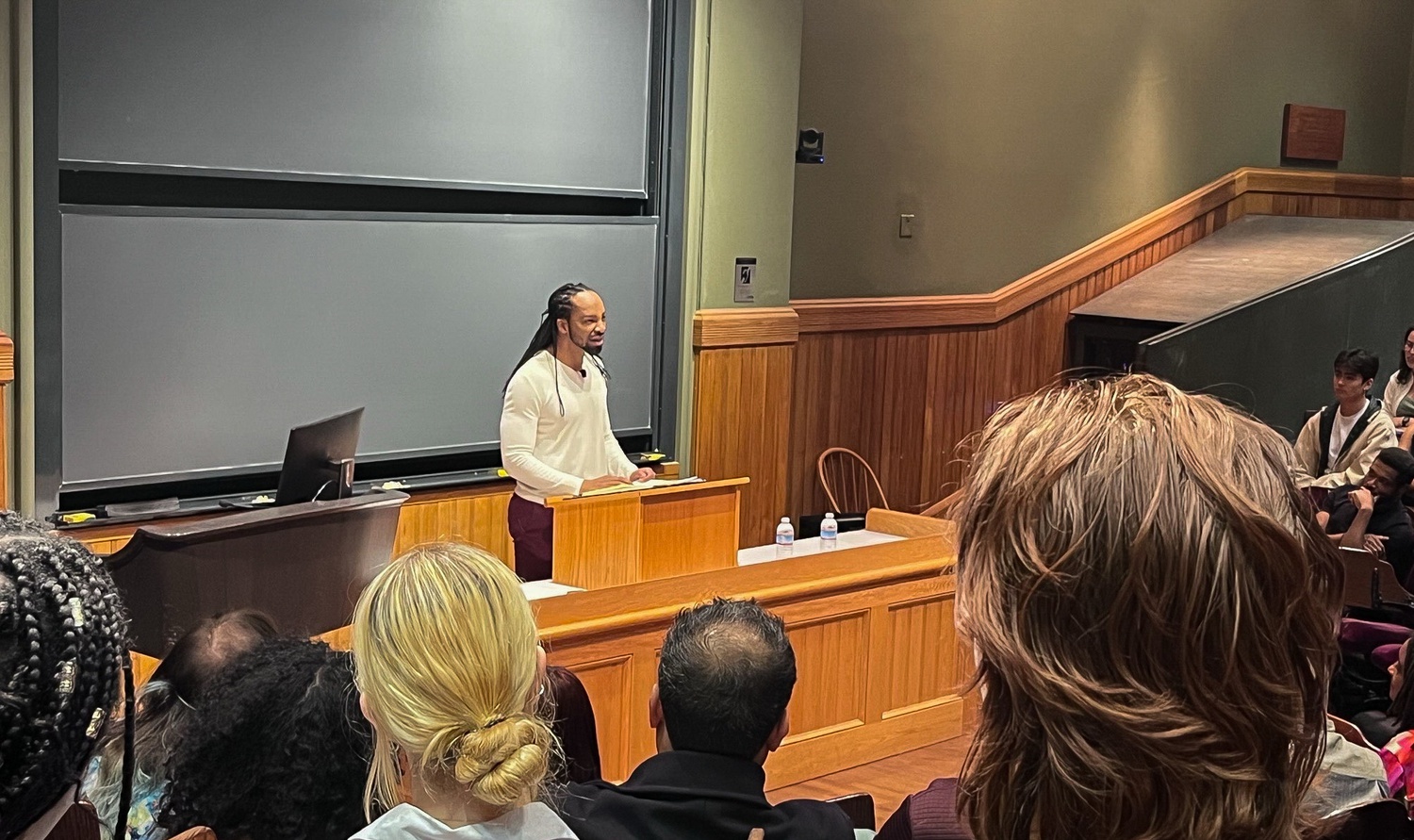
News
LIVE UPDATES: Day 3 of Harvard Yard Encampment

News
Majority of Harvard FAS Faculty Dispute Presence of ‘Systemic Antisemitism’ on Campus in Survey

News
Board of Overseers Candidates Question Selection Process

News
Day 2 of Harvard Yard Encampment Faces Greater Threat of Disciplinary Action

News
Harvard Islamic Studies Program X Account Reinstated After University Intervenes
Jericho Brown Inspires Attendees at Morris Gray Poetry Reading

On Nov. 7, the Harvard Department of English invited writer and Pulitzer Prize-winning poet Jericho Brown for their Morris Gray Poetry Reading. Brown has authored several works of poetry, including “Please,” “The New Testament,” and “The Tradition,” from which he read a few pieces. Harvard Professor of English and African and African American Studies Tracy K. Smith, who helped organize the event, set the scene with opening remarks, introducing Brown's writing as one of “many traditions,” including the “Black lyric tradition.”
Audience member Micaela N. Rosen ’23 expressed a similar appreciation for his connection to the Black lyric tradition, saying Brown’s works were “very political,” and “rooted in Blackness.” When Rosen, who studies poetry at the College, was asked what they most admired about Brown and his works, Rosen said “You can understand his poetry. The way he writes is really beautiful, but you also know what he’s saying, which is not always the case in poetry.”
Crimson editor Serena Jampel ’25, who also studies poetry and read Brown’s book over spring break, recounted his “beautiful language and amazing imagery” as two of his greatest strengths.
“He just writes really evocative poetry that has such a masterful command of language. I just want someday to emulate maybe half of his talents. He truly is just an incredible poet,” she said. Jampel also expressed wanting to hear his poetry, specifically his duplex, a form he invented, “in his own words.”
Brown did in fact read several of his pieces from his different works, including a new poem inspired by the 1970s hit tv show “The Jeffersons,” and some duplexes from his book “The Tradition.”
Mia A. Ward ’24, who was also excited to hear his duplex poems, expressed her love for “The Tradition,'' saying it was a massive inspiration to a writer like herself. Ward admired the way Brown was “playing with form and creating his own type of form,” which she would like to incorporate in her own work.
“Before really studying him and studying his different types of poetry academically, I was just like a freestyle writer, like fuck form, it puts boundaries on writing,” she said. “But Jericho has introduced me to form, that you're able to express your thoughts more clearly through boundaries, and I really appreciate that.”
Brown acknowledged his love for form with a little dig at prose writers: “Can’t no prose writer read you the last page of their book.”
His poems were accompanied by witty remarks and life sentiments that made the audience laugh, clap, and ask questions after. When a question about his form was asked, he said simply, “every poem that we love says something twice. I can bring up anything I want, as long as I bring it up again.”
Student Dara F. Badon ’22, who took a class with Professor Tracy K. Smith, shared that she contemplated whether to attend the event, but then she reflected on how it felt to walk into Professor Smith’s class. “It felt like something was being spoken to me and I was being heard even when I wasn't speaking. I felt very nourished and very good, which is what I needed.” Badon also shared that after experiencing the event she did not “just appreciate Brown's work, but poetry as a whole.”
“It reaffirms the magic that is art and the magic that is poetry,” she said.
Tomisin M. Sobande ’26 said that although she didn’t necessarily know who Brown was two days prior, she loved it. “I am obsessed, he’s so intelligent,” she said. “A lot of the stuff he says goes beyond poetry and applies to our lives in general. His answers to a lot of the questions, those are just things we should apply to our lives to make our lives more fulfilling.”
The comments from attendees made it clear that Brown’s work can connect different generations of people and bridge the gap between older and more contemporary definitions of poetry.
“He just writes down lines he thinks of. That was inspiring to me because I've always felt like you have to know what you're writing about and write it all at once. He makes it more attainable. Poetry is like a higher order in my mind that I can’t reach, but I feel like he brought it down to earth,” Sobande said.
O'Gorman, who has an interest in writing, said that going to events like these inspires her and re-encourages her to write. “Overall, poetry is outdated and old, not relating to my life personally: it is inspiring to find a black, queer, poet who is young and living today and writing about current issues, and being able to read that in poetry,” she said.
After the event, Brown explained how he navigates the world of poetry. “The good thing is that I’m a Black poet, and for every Black poet that has ever been, there has never been any expectation,” he said. He referenced Gwendolyn Brooks, the first Black person to win a Pulitzer Prize: “She had no idea they were going to give it to her, or that anybody Black would be winning a Pulitzer Prize. You just do things knowing you got to do it for you.”
Want to keep up with breaking news? Subscribe to our email newsletter.
